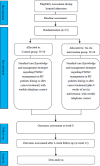Feasibility and potential effects of tai chi for the fatigue-sleep disturbance-depression symptom cluster in patients with breast cancer: protocol of a preliminary randomised controlled trial
- PMID: 34408044
- PMCID: PMC8375769
- DOI: 10.1136/bmjopen-2020-048115
Feasibility and potential effects of tai chi for the fatigue-sleep disturbance-depression symptom cluster in patients with breast cancer: protocol of a preliminary randomised controlled trial
Abstract
Introduction: The fatigue-sleep disturbance-depression symptom cluster (FSDSC) is one of the most common and debilitating side effects in patients with breast cancer (BC) throughout their treatment trajectory. Tai chi has been supported as a promising non-pharmacological intervention for the individual symptom relief of cancer-related fatigue, sleep disturbance and depression. However, relevant evidence of using tai chi for FSDSC management in patients with BC has been lacking.
Methods: This study will be a two-arm, single-blinded pilot randomised controlled trial involving an 8-week intervention and a 4-week follow-up. Seventy-two patients with BC experiencing the FSDSC will be recruited from two tertiary medical centres in China. The participants will be randomised to either a tai chi group (n=36) or a control group (n=36). The participants in the tai chi group will receive an 8-week tai chi intervention in addition to standard care, while the participants in the control group will receive standard care only consisting of a booklet on the self-management of cancer symptoms. The primary outcomes will include a series of feasibility assessments of the study protocol in relation to the study's methodological procedures, including subject recruitment and follow-up process, completion of study questionnaires and the feasibility, acceptability and safety of the intervention. The secondary outcomes will be the clinical outcomes regarding the effects of tai chi on the FSDSC and quality of life, which will be evaluated by the Brief Fatigue Inventory, the Pittsburgh Sleep Quality Index, the Hospital Anxiety and Depression Scale and the Functional Assessment of Cancer Therapy-Breast questionnaires.
Ethics and dissemination: Ethics approval was obtained from relevant sites (H19094, KY2019133, 201932). The findings of the study will be published in peer-reviewed scientific journals and at conferences.
Trail registration number: NCT04190342; Pre-results.
Keywords: breast tumours; clinical trials; complementary medicine.
© Author(s) (or their employer(s)) 2021. Re-use permitted under CC BY-NC. No commercial re-use. See rights and permissions. Published by BMJ.
Conflict of interest statement
Competing interests: None declared.
Figures
References
-
- Dodd MJ, Miaskowski C, Paul SM. Symptom clusters and their effect on the functional status of patients with cancer. Oncol Nurs Forum 2001;28:465–70. - PubMed
Publication types
MeSH terms
Associated data
LinkOut - more resources
Full Text Sources
Medical

